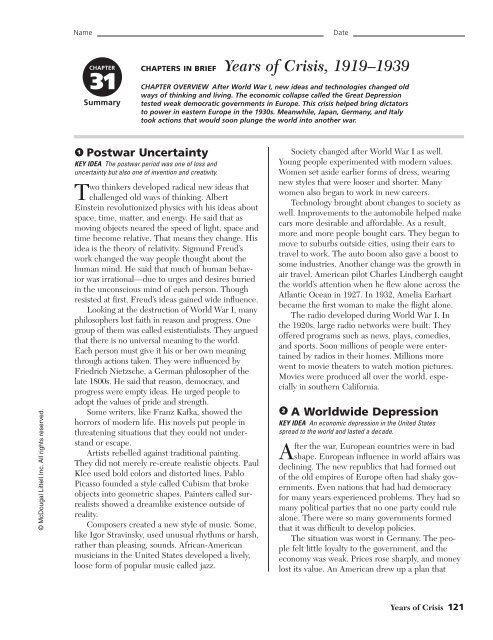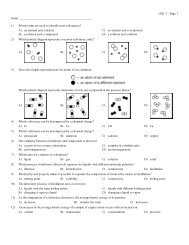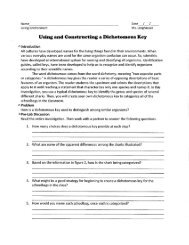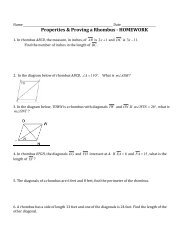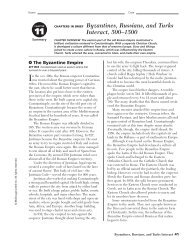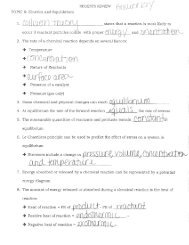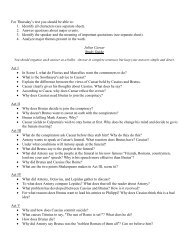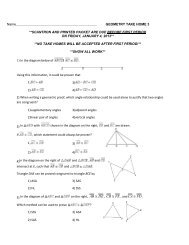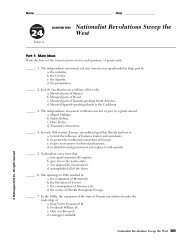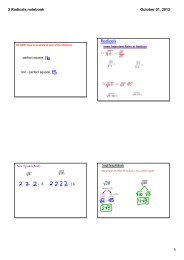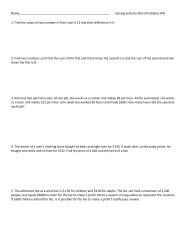CHAPTERS IN BRIEF Years of Crisis, 1919â1939 - Jones College ...
CHAPTERS IN BRIEF Years of Crisis, 1919â1939 - Jones College ...
CHAPTERS IN BRIEF Years of Crisis, 1919â1939 - Jones College ...
You also want an ePaper? Increase the reach of your titles
YUMPU automatically turns print PDFs into web optimized ePapers that Google loves.
NameDateCHAPTER31Summary<strong>CHAPTERS</strong> <strong>IN</strong> <strong>BRIEF</strong> <strong>Years</strong> <strong>of</strong> <strong>Crisis</strong>, 1919–1939CHAPTER OVERVIEW After World War I, new ideas and technologies changed oldways <strong>of</strong> thinking and living. The economic collapse called the Great Depressiontested weak democratic governments in Europe. This crisis helped bring dictatorsto power in eastern Europe in the 1930s. Meanwhile, Japan, Germany, and Italytook actions that would soon plunge the world into another war.© McDougal Littell Inc. All rights reserved.1Postwar UncertaintyKEY IDEA The postwar period was one <strong>of</strong> loss anduncertainty but also one <strong>of</strong> invention and creativity.Two thinkers developed radical new ideas thatchallenged old ways <strong>of</strong> thinking. AlbertEinstein revolutionized physics with his ideas aboutspace, time, matter, and energy. He said that asmoving objects neared the speed <strong>of</strong> light, space andtime become relative. That means they change. Hisidea is the theory <strong>of</strong> relativity. Sigmund Freud’swork changed the way people thought about thehuman mind. He said that much <strong>of</strong> human behaviorwas irrational—due to urges and desires buriedin the unconscious mind <strong>of</strong> each person. Thoughresisted at first, Freud’s ideas gained wide influence.Looking at the destruction <strong>of</strong> World War I, manyphilosophers lost faith in reason and progress. Onegroup <strong>of</strong> them was called existentialists. They arguedthat there is no universal meaning to the world.Each person must give it his or her own meaningthrough actions taken. They were influenced byFriedrich Nietzsche, a German philosopher <strong>of</strong> thelate 1800s. He said that reason, democracy, andprogress were empty ideas. He urged people toadopt the values <strong>of</strong> pride and strength.Some writers, like Franz Kafka, showed thehorrors <strong>of</strong> modern life. His novels put people inthreatening situations that they could not understandor escape.Artists rebelled against traditional painting.They did not merely re-create realistic objects. PaulKlee used bold colors and distorted lines. PabloPicasso founded a style called Cubism that brokeobjects into geometric shapes. Painters called surrealistsshowed a dreamlike existence outside <strong>of</strong>reality.Composers created a new style <strong>of</strong> music. Some,like Igor Stravinsky, used unusual rhythms or harsh,rather than pleasing, sounds. African-Americanmusicians in the United States developed a lively,loose form <strong>of</strong> popular music called jazz.Society changed after World War I as well.Young people experimented with modern values.Women set aside earlier forms <strong>of</strong> dress, wearingnew styles that were looser and shorter. Manywomen also began to work in new careers.Technology brought about changes to society aswell. Improvements to the automobile helped makecars more desirable and affordable. As a result,more and more people bought cars. They began tomove to suburbs outside cities, using their cars totravel to work. The auto boom also gave a boost tosome industries. Another change was the growth inair travel. American pilot Charles Lindbergh caughtthe world’s attention when he flew alone across theAtlantic Ocean in 1927. In 1932, Amelia Earhartbecame the first woman to make the flight alone.The radio developed during World War I. Inthe 1920s, large radio networks were built. They<strong>of</strong>fered programs such as news, plays, comedies,and sports. Soon millions <strong>of</strong> people were entertainedby radios in their homes. Millions morewent to movie theaters to watch motion pictures.Movies were produced all over the world, especiallyin southern California.2A Worldwide DepressionKEY IDEA An economic depression in the United Statesspread to the world and lasted a decade.After the war, European countries were in badshape. European influence in world affairs wasdeclining. The new republics that had formed out<strong>of</strong> the old empires <strong>of</strong> Europe <strong>of</strong>ten had shaky governments.Even nations that had had democracyfor many years experienced problems. They had somany political parties that no one party could rulealone. There were so many governments formedthat it was difficult to develop policies.The situation was worst in Germany. The peoplefelt little loyalty to the government, and theeconomy was weak. Prices rose sharply, and moneylost its value. An American drew up a plan that<strong>Years</strong> <strong>of</strong> <strong>Crisis</strong> 121
Name<strong>Years</strong> <strong>of</strong> <strong>Crisis</strong> continued© McDougal Littell Inc. All rights reserved.dictators. Only Czechoslovakia remained as ademocracy in eastern Europe.4Aggressors Invade NationsKEY IDEA As Germany, Italy, and Japan conqueredother countries, the rest <strong>of</strong> the world did nothing.In the 1930s, the major democracies—Britain,France, and the United States—still faced seriousproblems at home. Dictators in Germany and Italytook advantage <strong>of</strong> this and began moving to gainterritory. So, too, did Japan, now ruled by generals.These military leaders had taken power when theDepression struck. They planned to capture Chinaas a part <strong>of</strong> a Pacific empire.In 1931, the Japanese army captured Manchuria,a part <strong>of</strong> China. It was rich in coal and iron and as aresult provided valuable resources for the Japaneseeconomy. Other countries protested in the League<strong>of</strong> Nations but did nothing else. Japan ignored theprotests and in 1933 pulled out <strong>of</strong> the League. Itstayed in Manchuria, though. Four years later,Japan invaded China. The strong Japanese armyswept Chinese fighters aside. It killed tens <strong>of</strong> thousands<strong>of</strong> Chinese in the city <strong>of</strong> Nanjing. Chineseforces—both the Nationalists <strong>of</strong> the governmentand Communist rebels—continued to fight Japan.Italy’s Mussolini wanted an Italian empire inAfrica, and in 1935 he invaded Ethiopia. His troopswon easy victory. Haile Selassie, the emperor <strong>of</strong>Ethiopia, pleaded to the League <strong>of</strong> Nations forhelp. The League did nothing.Hitler made moves also. He broke the VersaillesTreaty by rebuilding Germany’s army. In 1936, hesent troops into an area <strong>of</strong> Germany that the treatyhad forbidden them to enter. France and Britainagain refused to stand up to Germany. This movewon Hitler more support in Germany. That year, hesigned an agreement with Mussolini and also withJapan. The three nations were called the AxisPowers.In 1936, Spain erupted in civil war as the armyrevolted against a leftist government. Hitler andMussolini sent aid to the army, which was backedby Spanish Fascists. The Soviet Union sent aid tothe government. In 1939, the army won andFrancisco Franco became Spain’s Fascist dictator.In March 1938, Hitler moved his troops intoAustria. He made it part <strong>of</strong> Germany, breaking theVersailles Treaty again. France and Britain oncemore did nothing. The next year, Hitler demandedthat Czechoslovakia give up part <strong>of</strong> its land toGermany. The country refused, but Britain andFrance agreed to allow Germany to take the land.Hitler promised to respect the new borders <strong>of</strong>Czechoslovakia, but a few months later he took theentire country.In the summer <strong>of</strong> 1939, Hitler made a similardemand <strong>of</strong> Poland. That nation also refused to giveup land. Britain and France now said that theywould protect Poland. But Hitler guessed theywould not back this up. Meanwhile, he made anagreement with Soviet dictator Joseph Stalin inwhich the two countries promised never to attackeach other.ReviewClarifying1. What ideas <strong>of</strong> Einstein and Freud challenged oldways <strong>of</strong> thinking?2. How did technology change society after thewar?3. Comparing and Contrasting Compare theFrench approach to the Depression with theNew Deal.4. Analyzing Causes and Recognizing EffectsWhat European nations came to be ruled by dictators,and why?5. Following Chronological Order Describe thesequence <strong>of</strong> events in the 1930s that led to war.<strong>Years</strong> <strong>of</strong> <strong>Crisis</strong> 123


